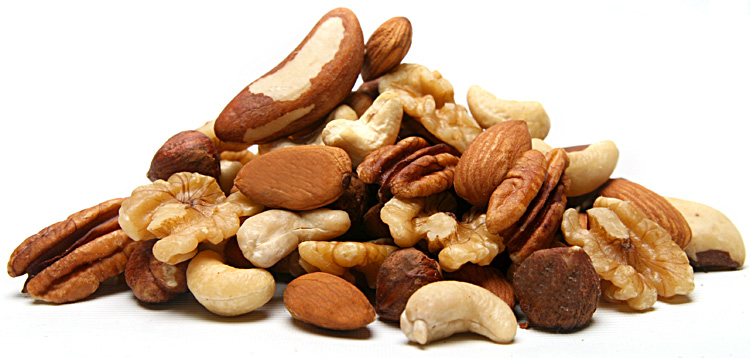Top 7 Foods for Stress Relief
Stress can take a toll on your body’s natural defenses, but eating the right foods can offer relief.
We all feel wrung out sometimes by the stress of daily life and, unfortunately, we tend to reach for junk food. But high-calorie or sugary foods only trick us into thinking we feel better. End the cycle of eating bad-for-you foods and find relief elsewhere. Instead, add these truly anti-stress foods to your diet.
Eating healthy food—and making that a conscious choice—can actually offer some real stress relief.

1. Snack on Nuts
Stress depletes our B vitamin stores and snacking on nuts helps replenish them. “B vitamins keep our neurotransmitters in their happy place and help us handle the fight-or-flight stress response,” says Ellen Albertson, Ph.D., R.D., a psychologist in Burlington, Vermont, and founder of smashyourscale.com. The potassium in nuts is also key: Penn State researchers found that a couple servings of potassium-packed pistachios a day can lower blood pressure and reduce the strain stress puts on our heart.
2. Add in Red Peppers
While oranges get all of the vitamin C hype, red peppers have about twice as much (95 vs. 50 mg per 1/2-cup serving). In a study in Psychopharmacology, people who took high doses of C before engaging in stress-inducing activities (oral presentation followed by solving math problems aloud) had lower blood pressure and recovered faster from the cortisol surge than those who got a placebo. “Diets loaded with vitamin-C-rich foods lower cortisol and help people cope,” says Elizabeth Somer, R.D.
3. Serve Salmon Twice a Week
“To keep your wits about you when life gets hairy, you need omega-3s, especially DHA,” says Somer. In a study in Brain, Behavior and Immunity, people who took a daily omega-3 supplement (containing DHA and EPA) for 12 weeks reduced their anxiety by 20 percent compared to the placebo group. You won’t get the same mood boost from the omega-3s (ALA) in flax, walnuts and soy, though, so shoot for about 2 servings a week of wild salmon or other oily fish and/or talk to your doctor about DHA supplements.
4. Bust Out the Spinach
This leafy-green veggie is rich in stress-busting magnesium. People with low magnesium levels (most of us, actually) are more likely to have elevated C-reactive protein levels—and research shows people with high CRP levels are more stressed and at a greater risk for depression. “Magnesium helps regulate cortisol and blood pressure too,” says Somer. And since magnesium gets flushed out of the body when you’re stressed, it’s crucial to get enough. Other solid magnesium sources: beans, brown rice.
5. Fill Up on Oatmeal
“Oatmeal is warm and comforting—and it also helps your brain generate the destressing neurotransmitter serotonin,” says Albertson. Research in the Archives of Internal Medicine shows carb-eaters felt calmer than those who shunned carbs. The carb-avoiders reported feeling more stressed. Any carb won’t do, however. Refined carbs (white bread and pasta) digest faster and spike blood sugar, messing with moods and stress. Complex carbs like oatmeal are digested more slowly and don’t spike blood sugar.
6. Indulge in Dark Chocolate
If you crave chocolate when you’re on edge, have some. Research in the Journal of Proteome Research showed people who ate the equivalent of an average-size candy bar (about 1.4 ounces) daily for two weeks had lower cortisol and fight-or-flight hormone levels. To reap the feel-better rewards, choose chocolate that’s at least 70 percent cocoa. And remember: dark chocolate is a high-calorie food, so mind your portions.
7. Sip Tea
A study from University College London discovered that tea drinkers de-stressed faster and had lower cortisol levels than those who drank a placebo. Although (caffeinated) black tea was used in the study, caffeine revs the stress response in many people, so stick to decaf and herbal teas. “Drinking herbal teas like chamomile, peppermint or ginger can be wonderfully soothing to the digestive tract, which can help with stress by calming the nervous system in your gut,” says Kathie Swift, M.S., R.D.N., author of The Swift Diet.












Recent Comments